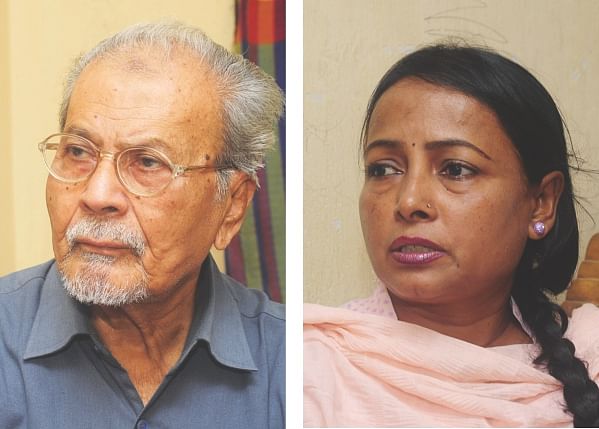| Home - Back Issues - The Team - Contact Us |
 |
| Volume 11 |Issue 44| November 09, 2012 | |
|
|
Perspective Jailed Abroad AH Mamun Nurun Nahar Lovely was born and brought up in a family of signboard artists. She was the women affairs secretary of Bangladesh Commercial Artists Association. She was married to the son of sculptor Rashid Ahmed. When she went on a trip to India with her father-in-law eight years ago, she didn't have the premonition that her life would never be the same again. Rashid Ahmed and Lovely were arrested in India on charges of allegedly possessing counterfeit Indian currency in 2004. After the arrest, they were both sent to jail and did not return home until a few weeks ago. On returning, both of them have found that there is little left to return to. Lovely does not know the whereabouts of her husband yet. “I hear that he got married to somebody else and is not willing to see me now,” she says. Lovely's teenage daughter died while she was away. “She was sick, but I don't know if she was taken care of properly.” Since she didn't receive a single letter from her husband while she was in prison, she is not even sure how her daughter died. “In fact, I have no intention to see him even if he wants me to. Sometimes I feel like killing myself,” she adds. “I have nowhere to go. I have no home, I move from one of my kin people's homes to another as an uninvited guest who is not particularly welcomed,” she says. When the sculptor and his daughter-in-law returned home after being punished for a crime they had never committed, the Bangladeshi media ran their sad story for the first few days. However, none of the media reports have elicited any action from the government. “I have not been waiting eagerly to return home to be treated like this. The Bangladeshi High Commission in India didn't even pay for our tickets home,” says Rashid. Rashid is living at his daughter's place now. The few properties he had around Dhaka had been sold while he was away. His youngest daughter Lipi was a teenager when Rashid went to India. However, she went to India twice during this period and tried to get her father out of jail to no avail.
Before going to India, Rashid lived in a rented house with his family in Basabo. His wife died years ago. Two months after he went to India, the owner of the house drove Lipi away and sold all his furniture. Lipi has been living a hard life since then. Knowing that he should seek help from the Bangladeshi High Commission in India, Rashid sent one message after another to the commission despite it being very difficult to send letters or messages from jail. However, the officials told him to be patient and wait and did nothing to get him out. In addition, they said that it is very difficult for them to even get a permission to see him in the prison. “Rather, the Indian journalists, who were sympathetic to our sufferings, have done a lot more than what the Bangladeshi High Commission did for us,” says Lovely. She added that when they got out of prison, a journalist of Times of India raised her voice for their cause and bought them air plane tickets to Bangladesh and gave her father-in-law Rs 1,000 as pocket money. “They [the journalists] were surprised to see the sheer indifference of Bangladeshi High Commission.” Rashid's health deteriorated a lot while he was in prison. He is now 78 years old and suffers from hypertension, asthma, diabetes and cardiologic complications. “What makes me really dumbfounded is the fact that the government has not yet taken any initiative to compensate me for my losses,” he says. Rashid Ahmed is the sculptor of Mukto Bangla at Islamic University in Kushtia and Muktijuddher Smriti Saudha in Sherpur. According to Lipi, her father was owed Tk 5-6 lakh by the government for his work. “I have repeatedly tried to get the money from the authority but they always told me to bring my father,” she says. After she told them that she had the authorisation letter of her father, they informed that they didn't have enough funds to pay. “I met the District Commissioner of Sherpur last September to see if he would pay my father's money, but I didn't get anything.” Lipi informs that her father made the Smritisoudha in Sherpur in 2003. But the government has not yet paid his bill. “I lived in a student dormitory all these years and earned my living with private tuitions. But what am I supposed to do with my old father now?” asks Lipi. Meanwhile, the Indian journalists who helped Rashid and Lovely return home still call Lovely to see how she is doing in her homeland. "I am losing my sanity. Sometimes I think I will just go back to India and ask their government to give me back my life and just kill myself if they refuse to do anything,” she says, “My life is over anyway.” The number of Bangladeshi people rotting in prisons in other countries is not small. Our high commissions in those countries have a responsibility to help them. Since our High Commission failed in this case to help when it was necessary, it is now the duty the government to help Rashid and his family.
Copyright
(R) thedailystar.net 2012 |
||||
